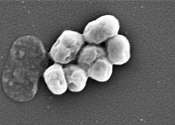Generative AI develops potential new drugs for antibiotic-resistant bacteria
With nearly 5 million deaths linked to antibiotic resistance globally every year, new ways to combat resistant bacterial strains are urgently needed.
Mar 28, 2024
0
95
Hi Tech & Innovation

With nearly 5 million deaths linked to antibiotic resistance globally every year, new ways to combat resistant bacterial strains are urgently needed.
Mar 28, 2024
0
95
Computer Sciences

In its on-going campaign to reveal the inner workings of the Sar-CoV-2 virus, the U.S. Department of Energy's (DOE) Argonne National Laboratory is leading efforts to couple artificial intelligence (AI) and cutting-edge simulation ...
Sep 1, 2021
0
96
Machine learning & AI

A drug molecule developed though machine learning? An announcement has been made that a phase I clinical study of DSP-1181, that was created using Artificial Intelligence (AI), has been initiated in Japan.
Computer Sciences

Which drug molecule is most effective? Researchers are feverishly searching for efficient active substances to combat diseases. These compounds often dock onto proteins, which usually are enzymes or receptors that trigger ...
Nov 13, 2023
0
53
Machine learning & AI

For decades scientists have been trying to figure out how to swiftly predict the twisting, tangled shape of proteins—and from there unravel a greater understanding of the machinery of life itself.
Dec 1, 2020
0
85
Machine learning & AI

One of the challenges in using machine learning for drug development is to create a process for the computer to extract needed information from a pool of data points. Drug scientists must pull biological data and train the ...
Dec 19, 2019
0
32
Engineering

Machine learning (ML) has been used with impressive success in numerous fields—facial recognition, speech recognition, consumer behavior, and drug discovery. One area where it's had only limited success, though, is as a ...
Jan 18, 2023
0
10
Business

Employers have decided to eliminate hundreds of biotech and tech jobs in the East Bay with layoffs at companies in Emeryville and Newark, a fresh round of unsettling job cuts during uncertain economic times.
Oct 26, 2022
0
2
Electronics & Semiconductors

A group of 10 universities led by the University of California, San Diego is undertaking a $50.5 million effort to greatly improve the speed and efficiency of computers, work that could do everything from make drug discovery ...
Jan 18, 2023
0
9
Engineering

A drug discovery scientist typically screens up to 10,000 compounds in the early stages of developing one FDA approved drug. During this high-throughput screening, candidate compounds are initially tested on cell and tissue ...
Mar 4, 2020
0
3
In the fields of medicine, biotechnology and pharmacology, drug discovery is the process by which drugs are discovered and/or designed.
In the past most drugs have been discovered either by identifying the active ingredient from traditional remedies or by serendipitous discovery. A new approach has been to understand how disease and infection are controlled at the molecular and physiological level and to target specific entities based on this knowledge.
The process of drug discovery involves the identification of candidates, synthesis, characterization, screening, and assays for therapeutic efficacy. Once a compound has shown its value in these tests, it will begin the process of drug development prior to clinical trials.
Despite advances in technology and understanding of biological systems, drug discovery is still a lengthy, "expensive, difficult, and inefficient process" with low rate of new therapeutic discovery. Information on the human genome, its sequence and what it encodes has been hailed as a potential windfall for drug discovery, promising to virtually eliminate the bottleneck in therapeutic targets that has been one limiting factor on the rate of therapeutic discovery.[citation needed] However, data indicates that "new targets" as opposed to "established targets" are more prone to drug discovery project failure in general[citation needed] This data corroborates some thinking underlying a pharmaceutical industry trend beginning at the turn of the twenty-first century and continuing today which finds more risk aversion in target selection among multi-national pharmaceutical companies.[citation needed]
This text uses material from Wikipedia, licensed under CC BY-SA